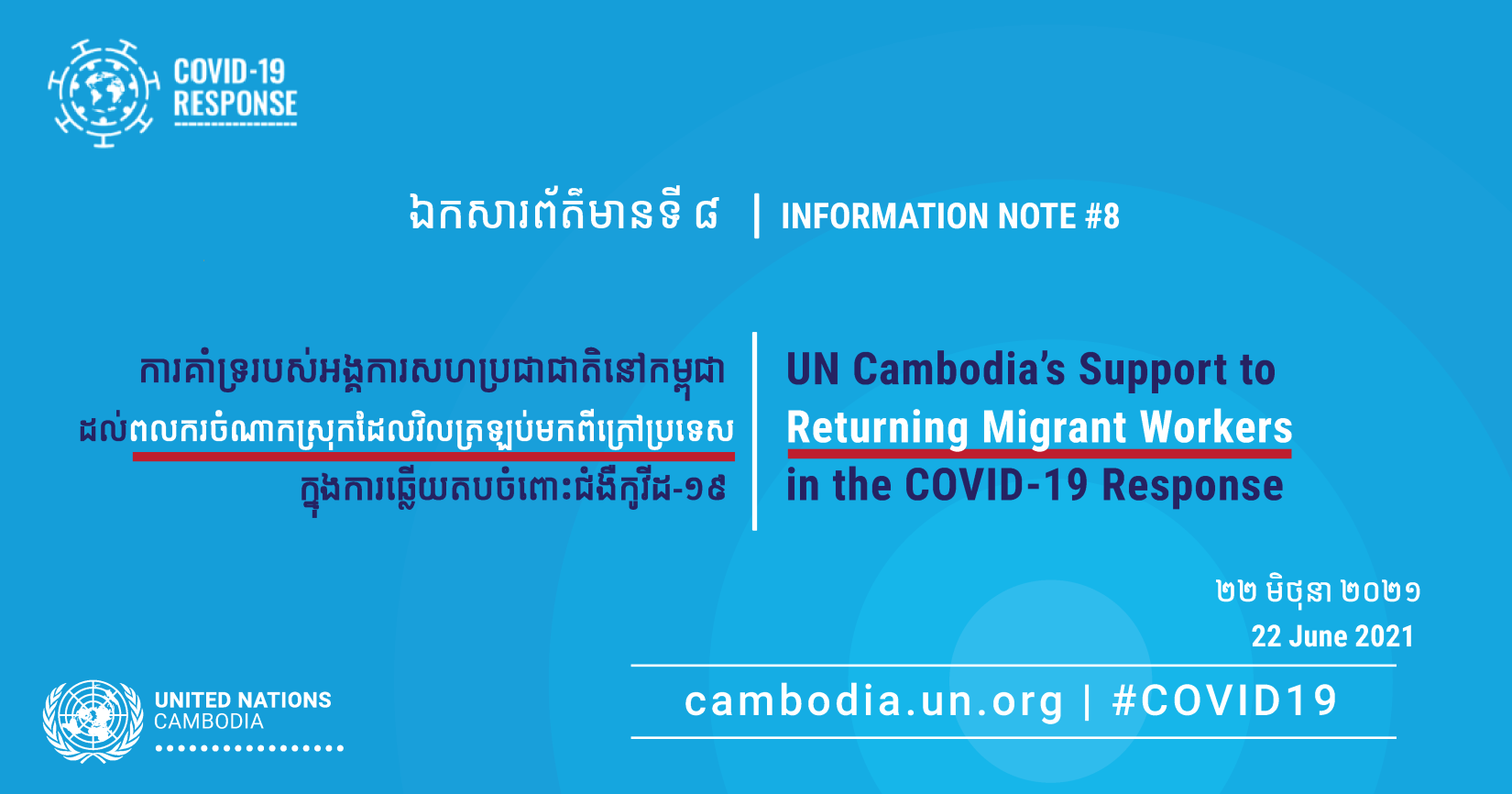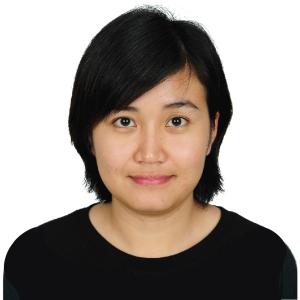Information Note #8: UN Cambodia’s Support to Returning Migrant Workers in the COVID-19 Response
22 June 2021

Migration is an important economic lifeline for families in Cambodia. In the Mekong region, active migration corridors suddenly closed for extended periods with countries applying strict entry rules to control the COVID-19 pandemic within their borders. Deployment and outflows of migrant workers plummeted, especially during the first months of the pandemic. Loss of jobs, economic restrictions and lockdowns in host countries, led to the return of many migrant workers to their home countries. To date, over 200,000[1] (43% women) Cambodian migrant workers have returned to Cambodia from neighbouring countries since the beginning of the COVID-19 pandemic.
A Report by the United Nations on the impact of COVID-19 on returning migrant workers offers compelling evidence of the hardships and vulnerabilities that returning migrants face. It demonstrated that nearly 30% of returned migrant worker households have no income at all and more than 50% of returned migrant workers have debts. Women returned migrant workers are more likely than men to have no money and face more difficulties finding employment. In terms of accessing social assistance and essential health services, only 25% of returned migrants have IDPoor cards and over 49% have problems accessing health care due to lack of money or distance to health care providers.
The United Nations closely collaborates with the Royal Government of Cambodia and civil society organizations to assist returning migrant workers and to protect their rights. The United Nations prioritizes providing direct assistance to migrants at points of entry and in quarantine facilities and mitigating the socio-economic impact on the most vulnerable and preventing the spread of the virus in communities of return. Through UN-supported Migrant Worker Resource Centres, the United Nations is providing counselling, food supplies, transportation, skills training, dispute resolution and job opportunities for returning migrant workers.
To facilitate infection prevention and control, the United Nations has provided over 125,000 returned migrants with critical water and hygiene services such as regular supply of soap and cleaning materials, set up mobile hand-washing stations, and renovated toilets at points of entry and quarantine facilities. Over 162,000 returning migrant workers arriving at points of entry in Cambodia and those who were referred for quarantine received information on COVID-19 prevention, health and social services with support from the United Nations and partner NGOs. In addition, over 21,000 members of rural communities with high numbers of returning and prospective migrants benefitted from COVID-19 awareness raising sessions directly in their villages. Broad dissemination of information on COVID-19 prevention, risk communications and engagement are critical to protecting health and livelihoods of returning migrants and communities.
The United Nations, in collaboration with partners, provided direct return assistance and nearly 131,000 returning migrants arriving at points of entry and those referred for quarantine received emergency food assistance. Over 16,000 migrants placed in quarantine received hygiene kits, which included sleeping and personal hygiene materials. Together with the Ministry of Health, local authorities, and partner NGOs, the United Nations supported vulnerable returning migrants (including children, women, women-headed households, and those living with HIV) in accessing health and social services through referrals in communities of return, including facilitating access to the IDPoor cash transfer programme and information about job opportunities and training. In Banteay Meanchey, Battambang, Siem Reap, Kampong Cham, Prey Veng, and Kampot provinces, the United Nations worked to strengthen livelihoods and supported over 700 returned migrants with cash grants to set up small income generating activities.
Addressing the impact on mental health has been an integral part of the United Nations COVID-19 response. To complement the efforts of the Ministry of Health, the United Nations and partner NGOs have trained over 800 professionals, provincial government officials and social service workers on providing psychosocial counselling for children, women, including women migrants, in quarantine. Over 175,000 children, parents and caregivers have been reached by awareness raising activities and consultations on mental health and psychosocial support. In addition, the United Nations produced three animation videos targeting returning migrant workers with a focus on mental health, employment opportunities and migration journey which has reached close to 500,000 people.
The COVID-19 pandemic disproportionally impacts women [2], including women migrants, in Cambodia. The United Nations’ response prioritized the continuity of gender-based violence (GBV) prevention services during the pandemic, including referral and safe shelter services, counselling, and ongoing public information campaigns aimed at changing attitudes and eliminating discrimination against women migrants. Over 3,600 vulnerable migrants received hygiene kits in quarantine facilities and areas of return. With the support of the United Nations, 35 government social workers were specifically deployed to monitor the situation of children, focusing on children of returning migrants, providing case management and facilitating referrals. Over 5,000 returning migrant women were provided with maternal care support, GBV information and psychosocial support.
The United Nations supports the General Department of Immigration and General Commissariat of National Police to adopt a health-compliant approach to managing border procedures to mitigate COVID-19 associated risks. Over 750 frontline officials at key checkpoints on the Cambodian-Thai border have been trained on COVID-19 prevention and provided with personal protective equipment (PPE). In addition, the United Nations supports efforts to prevent trafficking in persons through measures such as safe migration information briefings, capacity training for government officials on identification of suspected victims of trafficking in persons, access to livelihood opportunities, and ongoing skills training programmes for prospective migrant workers. Over 75,000 migrant returnees and prospective migrants accessed information about labour migration, regular migration channels, accessing support services for migrants and COVID-19 prevention through the Migrant Resource Centre in Poi Pet. Provincial Job Centres continue safe migration awareness raising reaching at least 7,000 migrants and aspiring migrants in key migrant provinces like Siem Reap, Battambang, Banteay Meanchey, Kampong Cham, Prey Veng and Kampot.
The United Nations encourages the authorities to protect and empower returning migrants to enable them to overcome the immediate and longer-term impacts of the COVID-19 pandemic. This includes protecting the basic human rights and labour rights of returning migrant workers and their families in line with Cambodia’s international human rights obligations, such as access to social protection, livelihood and health care. The United Nations also urges the authorities to ensure that ID Poor cards are provided to migrant returnees who meet the eligibility criteria and additional assistance is provided for accessing jobs or vocational training opportunities to enable effective reintegration into communities. Administrative procedures should also be simplified. Fees payable by migrant workers for migration should be eliminated or reduced to encourage people to pursue safe and regular migration channels. The United Nations System in Cambodia remains committed to work with the Royal Government and other partners to ensure safety, dignity and rights for all returning migrants and their families.
###
UN Cambodia’s Response to COVID-19 Information Notes are official documents from the United Nations in Cambodia intended for the media and other partners. They are prepared by the Office of the UN Resident Coordinator.
[1] https://www.who.int/cambodia/internal-publications-detail/covid-19-join…
[2] See also UN Information Note # 6 on Gender Based Violence and Sexual Reproductive Health Rights in COVID-19 Response and UN Information Note # 7 on Garment Workers in COVID-19 Response







